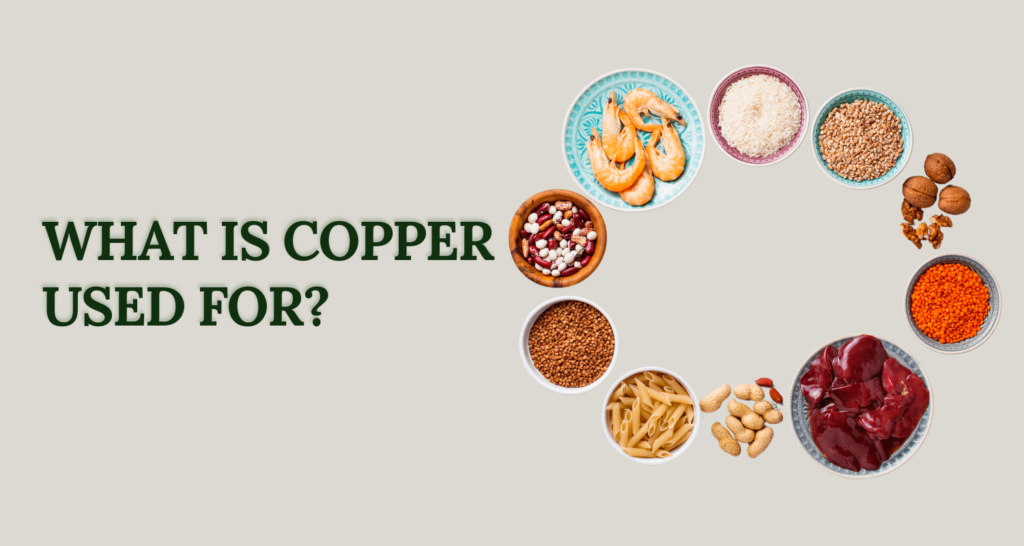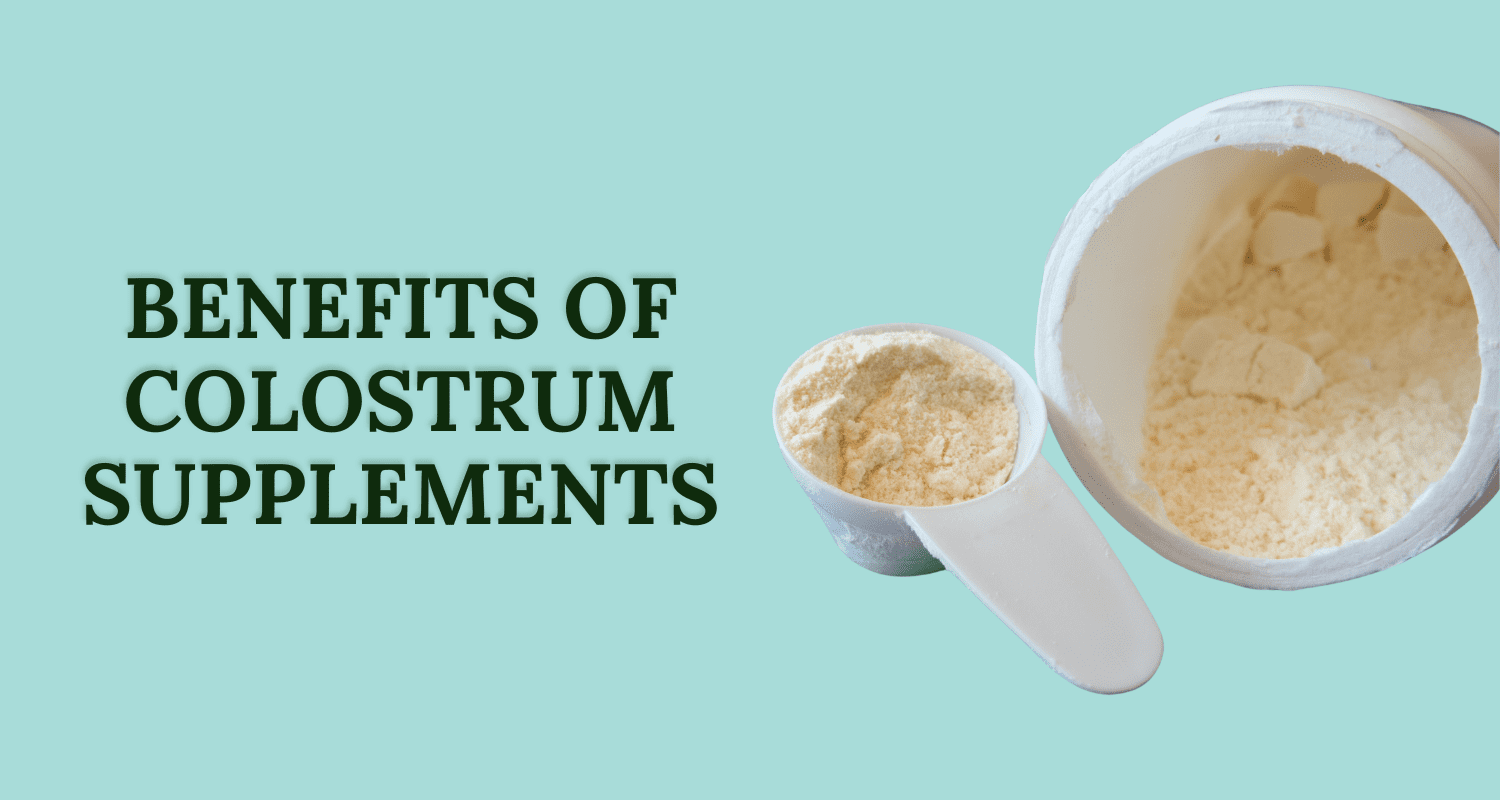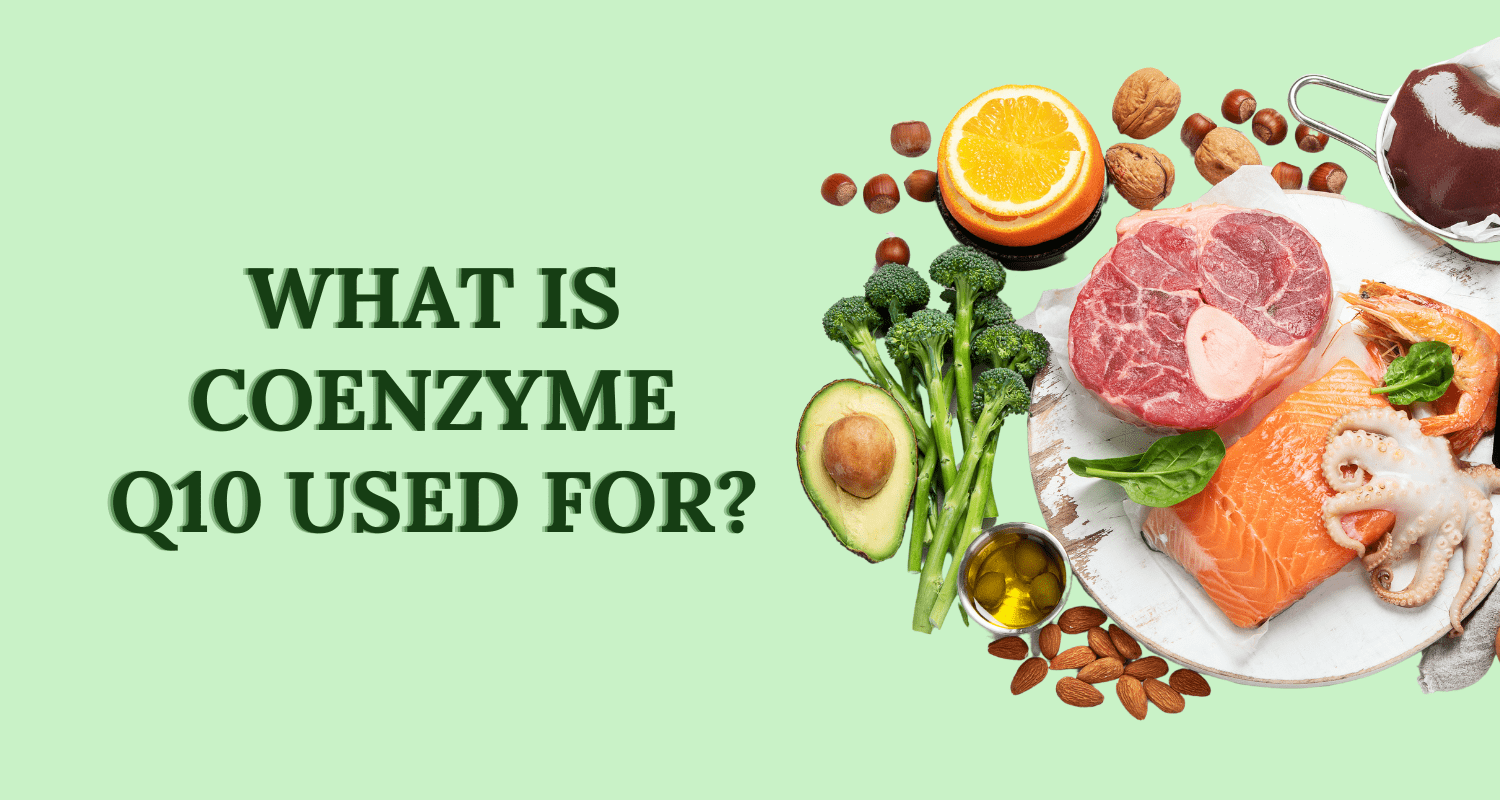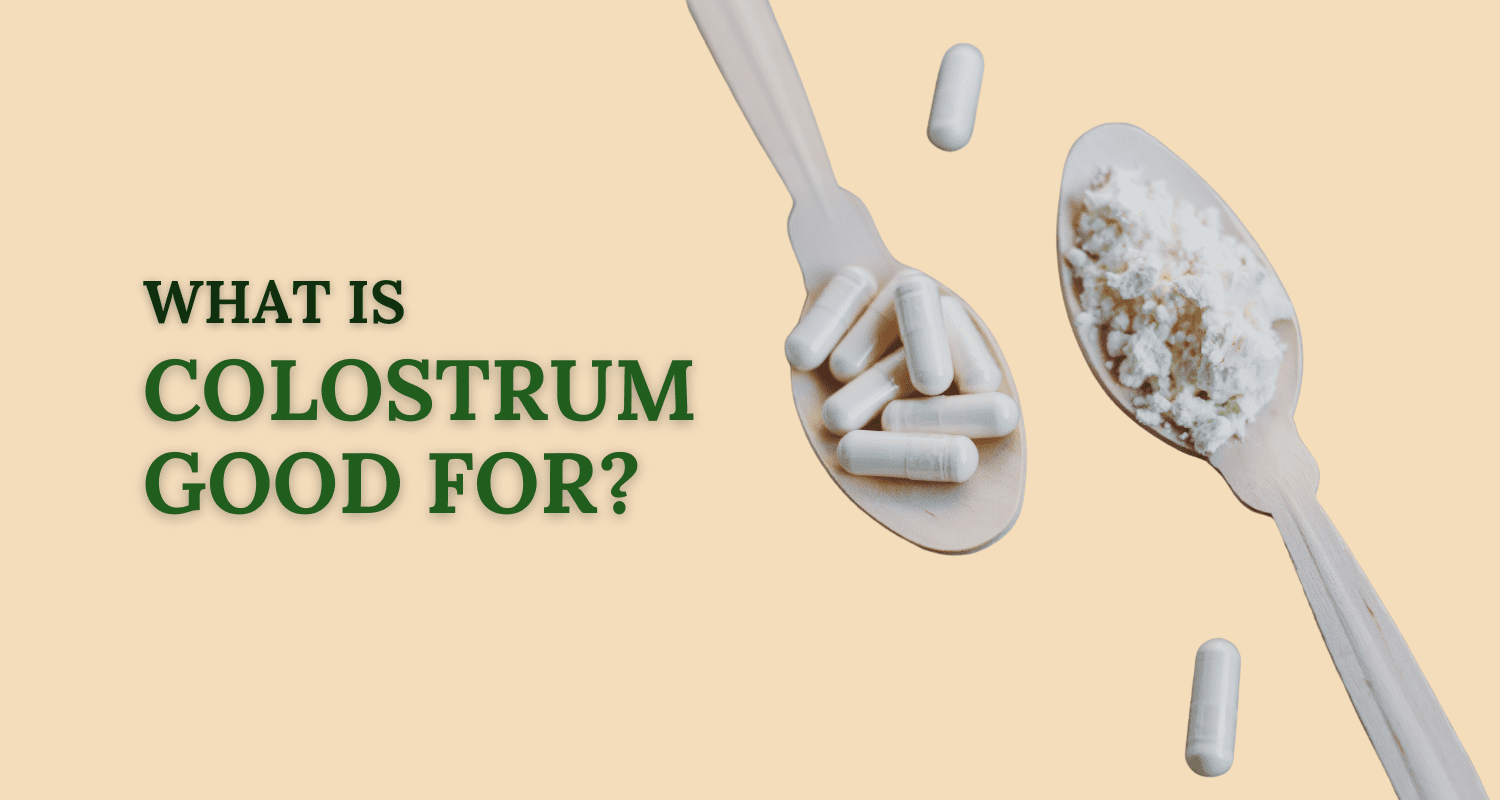Did you know copper is an important nutrient our body needs in small amounts? It helps with lots of things like making blood cells, keeping nerves working, and fighting off sickness. Copper also helps us use energy from food and keeps our skin and bones healthy.
Most of the copper in our body is in our main organs like the liver, brain, and heart. But, too much or too little copper is not good for us. It can hurt our brains and cause diseases like Menkes, Wilson’s, and Alzheimer’s.
Rarely, not having enough copper can lead to heart problems and other health issues. In this article, we’ll explore the most asked question: what is copper used for in our daily lives and also delve into obtaining copper from food sources, symptoms of copper toxicity, and health benefits.
Let’s explore the most burning question: what is copper used for?
Key Takeaways:
- Copper is important for many vital bodily functions.
- What is copper used for? It helps in making blood cells, nerve function, and immune defense.
- It is mainly found in our major organs and muscles.
- Wrong amounts of copper can harm our brains, causing serious diseases.
- Too little copper can also lead to heart troubles and other health problems.
Health Benefits of Copper
Copper is crucial for staying healthy. It plays a big part in keeping our hearts strong by helping to lower cholesterol and blood pressure. This is key to a healthy heart.
It’s not just the heart that needs copper. It’s also vital for our nervous systems and immunity. Copper supports how our brain cells talk to each other and helps fight off illnesses and infections.
Copper also helps make collagen. Collagen is a building block for the skin, bones, and blood vessels. With enough copper, our bodies can make more collagen, keeping our skin and bones strong.
Another cool thing about copper is its antioxidant power. That means it fights off free radicals that can damage our cells. By fighting free radicals, copper helps keep us healthy at the cellular level.
There’s even talk that copper could help with arthritis. While it’s not confirmed, early studies on animals show copper might slow arthritis down. We need more research to know if this is true for people.
To benefit from copper, be sure to get enough in your diet. Good food sources include oysters, whole grains, beans, potatoes, and leafy greens. Adding these to your meals can boost your copper intake.
It’s best to get your copper from food, rather than supplements. Food provides other helpful nutrients that work well with copper. But sometimes, like in certain health conditions, a doctor might recommend copper supplements.
In conclusion, copper has so many health perks. It helps our heart, brain, and bones, and might even play a role in preventing arthritis. To enjoy these benefits, eating a balanced diet that includes copper-rich foods is key.
Copper Deficiency and Health Risks
Copper deficiency is rare but serious. It can pose risks to health. It’s not common among those who eat a varied diet, but not getting enough copper can cause health issues.
One big health risk is more heart problems. Copper is key to a healthy heart. Without enough, you might face high cholesterol and blood pressure.
Not having copper can also mean fewer white blood cells. This is called neutropenia. It makes the body less able to fight off infections.
Copper helps keep bones strong, stopping osteoporosis. When you lack copper, your bones may break more easily. This is because not enough copper means less collagen, which bones need.
If your joints aren’t working well, copper might be the reason. Copper helps make connective tissues. If you don’t have enough, your joints might not work right.
And then there are diseases like Wilson’s disease and Alzheimer’s. They might be connected to not having enough copper. We’re still learning exactly how, but it seems copper plays a part.
Copper shortage can also show in your skin, heartbeat, thyroid, and body temperature. These are more signs something might be wrong with your copper levels.
Remember, getting too little copper is not common for healthy eaters. But some groups, like those with celiac disease, are more at risk.
To avoid the dangers of low copper, eat foods rich in copper. Seafood, nuts, and certain cereals can help you get the copper your body needs.
In the end, while it’s not usual, lacking copper is a serious health risk. Making sure your diet has enough copper is key to staying healthy.
Food Sources of Copper
Copper is a key element for our bodies to work right. Without enough copper, our health can suffer. We need to eat foods high in copper every day to stay healthy.
Oysters and shellfish are top choices for copper. They give us more than 600% of our daily copper needs in just 3.5 ounces.
Whole grains like quinoa, brown rice, and oatmeal are also good. They have copper fiber and other important nutrients.
Legumes and beans are rich in copper too. Foods like lentils, chickpeas, and black beans are full of this essential element as well as protein and fiber.
Don’t forget nuts when trying to eat more copper. Cashews and almonds pack a good copper punch. They also bring healthy fats and important minerals to the table.
Potatoes and dark leafy greens add copper to your diet too. A cup of cooked spinach or Swiss chard has a third of your daily copper needs.
Enhance your meals with dried fruits like prunes and figs. These fruits offer copper, fiber, and antioxidants.
Love cocoa and dark chocolate? They’re good for you too. A 3.5-ounce bar grants double the copper you need a day.
Spice up your dishes with black pepper, yeast, and cumin. They’re tasty additions that also provide some copper.
While copper is crucial, too much can harm us. A balanced diet is the best way to get the copper we need. Including these foods in your meals keeps your copper intake in check.
Copper Supplements and Interactions
Copper supplements can help those who don’t get enough copper from their diets. It’s usually best to get copper from food first. But, some people need supplements because of health conditions or a lack in their diet.
Be careful with copper supplements since too much can be harmful. Too high a dose of copper can cause toxicity. This can lead to several bad side effects.
It’s also vital to know about drug interactions with copper supplements. Copper interacts with certain medicines and supplements. These can change your blood’s copper levels and may cause health issues.
Before you start taking copper supplements, speaking with a doctor is a good idea. They can tell you the right amount to take and warn you about possible side effects. This step helps keep your copper intake safe and helpful.
Copper Deficiency and Causes
Copper deficiency happens when the body lacks an essential trace mineral. This can come about from various issues such as:
- Genetic defects of copper metabolism: Some people have a genetic problem with processing copper. They can’t absorb and use copper well, leading to a shortage.
- Absorption problems: Health issues like central nervous system demyelination can lower copper absorption. This leads to not having enough copper in the body.
- High intake of zinc or vitamin C supplements: Taking too much zinc or vitamin C can impact copper absorption. This triggers a deficiency.
- Infants consuming cow’s milk: Babies who drink cow’s milk instead of formula might not get enough copper. The formula is better as it’s designed to meet infants’ copper needs.
- Other metabolic diseases: Some metabolic diseases affect how the body absorbs copper. This can cause a copper deficiency.
Dealing with copper deficiency is crucial to avoid health problems. Knowing its causes helps in choosing the right actions to keep copper levels healthy.
Menkes Disease and Copper Imbalance
Menkes disease is a rare genetic disorder with a copper imbalance. It affects about 1 in 100,000 newborns.
It’s caused by issues with the ATP7A gene that make the body hard to move copper. So, there’s too little copper in the liver and brain.
This disease is mostly seen in baby boys. But girls can also get it, though it’s very rare.
Its signs start in infancy and most children don’t live past 3 years old. It’s really serious, and we need better treatments.
Copper shots can help by getting copper levels back to normal. But it works better if starts early. This helps children walk better and grow.
Right now, we can’t test newborns for this disease early. But, research through clinical trials might find a way to help. These studies need volunteers from different backgrounds to take part.
For more details, you can contact the National Organization for Rare Disorders (NORD).
Copper Imbalance and Neurodegeneration
Unbalanced copper levels can harm brain tissue. They can lead to diseases that damage the brain. These diseases can happen when there’s too much or too little copper. This can cause problems in the brain and lead to sickness.
One disease linked to too much copper is Wilson’s disease. It changes how the body handles copper. Without the ability to get rid of excess copper, it builds up in tissues. This includes the brain. Too much copper can lead to damage and inflammation, harming the brain.
Alzheimer’s disease is another example. It’s a condition that gets worse over time. Research shows that copper might play a part in forming harmful brain plaques in Alzheimer’s. These plaques can harm the brain and destroy nerve cells, causing the disease to progress.
Also, studies have found that balancing copper is crucial for healthy brain function. Disruptions in how the body regulates copper might contribute to several brain diseases. This includes Alzheimer’s and Parkinson’s. These diseases can seriously impact a person’s health over time.
It’s crucial to keep copper in the brain balanced. This helps prevent brain diseases. Yet, we still need more research to fully grasp how copper imbalance causes these illnesses. Learning more could lead to treatments that target how the body handles copper. These could help prevent or treat neurodegenerative diseases.
Copper Toxicity and Symptoms
Copper toxicity is rare but harmful, often from too much copper in things we use daily. It can come from supplements, water, or using copper cookware. Knowing its signs can help treat it early for better results.
Symptoms of Copper Toxicity
The signs of too much copper differ based on how much you’re exposed to and individual factors.
You might feel:
- Nauseous
- Vomiting
- Diarrhea
- Stomach pain
- Get headaches
- Feel dizzy
- Weak
- Taste metal in your mouth
Heavy copper exposure can cause more severe problems like:
- Harming the liver
- Faulty red blood cells
- Heart issues
If you think you have any of these signs or might be facing copper problems, get help from a doctor right away.
Preventing Copper Toxicity
To stop copper troubles, watch where you get copper from, and don’t overdo it.
Here’s what you can do:
- Avoid high-copper drinking water sources or use water filters that remove excess copper.
- Check and change copper plumbing in older homes often, because age can make pipes leak copper into the water.
- Use caution with copper cooking pots or utensils, especially for acidic or long cooking sessions.
- Reduce contact with chemicals or products high in copper, which includes some industrial or farming materials.
Being cautious and making choices to limit copper intake is key. This can help prevent too much copper and the health issues it can bring.
Obtaining Copper Through Diet
Most people get enough copper from their diet. A wide range of foods have copper, making meals enjoyable and varied.
Dietary Sources of Copper
Copper-rich foods include:
- Oysters
- Shellfish
- Whole grains
- Beans
- Nuts
- Potatoes
- Organ meats (kidneys, liver)
- Dark leafy greens
- Dried fruits
- Cocoa
- Black pepper
- Yeast
Eating these foods daily ensures you get enough copper. A balanced diet helps your body use copper better by combining it with other nutrients.
Choosing Food Over Supplements
Eating copper through food is better than taking supplements. Food gives you a mix of nutrients that supplements can’t match. It helps your body absorb copper better.
Be careful with copper supplements and talk to your doctor before taking them. They could cause problems if mixed with certain medicines.
Meeting Copper Intake Recommendations
The right amount of copper a person needs depends on their age and sex. Goals vary from 200 mcg to 1,300 mcg a day. Some recommendations are:
- Children aged 1 to 3 years: 340 mcg/day
- Children aged 4 to 8 years: 440 mcg/day
- Children aged 9 to 13 years: 700 mcg/day
- Adult males and females: 900 mcg/day
- Pregnant females: 1,000 mcg/day
- Lactating females: 1,300 mcg/day
Eating a mix of copper-rich foods helps you get what you need. Always talk to your doctor to know how much copper is right for you, especially if you’re pregnant or breastfeeding.
Remember to eat a balanced diet with lots of rich foods. This is key in meeting your daily nutrient needs and staying healthy.
Conclusion
What is copper used for? Copper is a key mineral for our bodies. It helps in making energy, building collagen, and keeping our hearts healthy. If you eat a varied diet, you’re likely getting enough copper. But, if you’re thinking about supplements, talk to a doctor first.
Research on what is copper used for says copper is great for our health. It helps our hearts, our brains, and our ability to fight off sickness. Yet, we still need to learn more about exactly how it helps and if it stops diseases.
Keeping a healthy level of copper is vital. How much you need depends on your age and what stage of life you’re in. Most adults should get between 1.5 and 3 mg of copper daily. Seafood, beans, nuts, and whole grains are all good sources.
Having too much copper is also a problem. This can happen if you take too many supplements. Or, if there’s too much copper in your water or in the air you breathe. Too much copper can cause stomach problems or harm your liver and heart.
In short, what is copper used for, copper is crucial for our health. It’s good for our hearts, our ability to fight off sickness, and for healthy skin and bones. While we rarely lack copper, it’s important to eat a balanced diet. Talking to a doctor to understand more about what is copper used for or before taking copper supplements is wise. This way, we make sure copper is only good for our bodies.
FAQs
What is copper used for?
Copper is used by the human body to form red blood cells, maintain healthy bones and nerves, and support the immune system.
What are 5 things copper is used for?
Five things copper is used for are the formation of red blood cells, maintaining healthy bones, supporting the immune system, aiding in iron absorption, and reducing inflammation.
What are 10 uses of copper?
Ten uses of copper include helping in collagen production, energy production, antioxidant defense, brain health, and melanin production, as well as supporting the nervous system, cardiovascular system, and thyroid function.
What are the 4 major uses of copper?
The four major uses of copper are in the formation of red blood cells, collagen production, energy production, and supporting the immune system.
What is copper’s main use?
The main use of copper is in the formation of red blood cells to carry oxygen and nutrients throughout the body.
What is the biggest use of copper?
The biggest use of copper is in supporting the production of red blood cells, which is essential for maintaining overall health.
Where is copper mainly used?
Copper is mainly used for various physiological processes such as aiding in the formation of red blood cells, supporting the immune system, maintaining bone health, and promoting overall well-being.
Disclaimer: This content, including advice, provides generic information only. It is not a substitute for a qualified medical opinion. Always consult a specialist or your doctor for more information. Nutrition Cult does not claim responsibility for this information.




